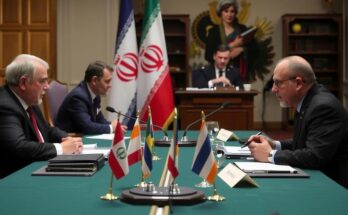The Biden administration faces significant challenges regarding the ongoing conflicts in the Middle East, particularly as the U.S. presidential election approaches. Secretary of State Antony J. Blinken has been attempting to negotiate a resolution to the war in Gaza amid growing discontent among progressive voters regarding U.S. support for Israel. Key developments include the assassination of Hamas leader Yahya Sinwar, which has revived discussions for a potential ceasefire and hostage negotiations. Blinken’s tour of the Middle East reflects an urgent need to stabilize the region ahead of the election.
As the U.S. presidential election approaches, the Biden administration finds itself grappling with ongoing conflicts in the Middle East. Secretary of State Antony J. Blinken endeavored to engage Israeli Prime Minister Benjamin Netanyahu in discussions aimed at establishing a U.S.-endorsed strategy to resolve the ongoing war in Gaza; however, there appears to be a lack of significant progress. Meanwhile, the humanitarian crisis unfolds as Israeli military actions, supported by American-made weaponry, continue to devastate Palestinian civilian populations. The situation is further complicated by escalating tensions in Lebanon and direct military confrontations between Israel and Iran, particularly in light of recent Israeli airstrikes targeting Iranian military installations. With less than three weeks until the election, progressive voters, particularly within Arab and Muslim American communities in key battleground states, have expressed their discontent over President Biden’s staunch backing of Israeli operations following a devastating Hamas attack last year. In response to these challenges, U.S. officials are striving for a pathway toward greater stability in the Middle East region. The Israeli military operation reached a critical point with the recent assassination of Yahya Sinwar, the leader of Hamas, on October 16. This incident provided Biden officials with a renewed opportunity to push for a swift negotiated resolution to the ongoing conflicts in both Lebanon and Gaza, where civilian casualties have been alarmingly high. In a bid to facilitate this process, President Biden dispatched Secretary Blinken on what marks his eleventh trip to the region during this wartime period. Notably, this trip exhibited an element of improvisation, given its last-minute planning; Mr. Blinken departed without a specific itinerary and had to cancel a planned meeting in Jordan before journeying to Saudi Arabia, Qatar, and unexpectedly, London, where he convened discussions with officials from Lebanon, Jordan, and the United Arab Emirates. During his visit to Doha, Secretary Blinken announced intentions for U.S. and Israeli negotiators to return to Qatar imminently to reignite discussions surrounding hostage negotiations and potential ceasefires with Hamas.
Leading up to the U.S. presidential election, the Biden administration is under pressure as it faces backlash from progressive constituents and Arab and Muslim American voters concerning its foreign policy in the Middle East. The ongoing conflicts—with significant casualties reported in Gaza and Lebanon—underscore the complex diplomatic challenges the administration faces. Furthermore, the recent killing of Hamas leader Yahya Sinwar has sparked renewed calls for negotiation, noting the delicate balance necessary to maintain support from different voter demographics in the U.S. while pursuing effective foreign policy interventions in tumultuous regions.
The Biden administration is navigating a precarious situation in the Middle East as it seeks to reconcile domestic political pressures with its foreign policy objectives. The urgency to stabilize the region and address humanitarian crises has grown, especially with impending elections. Secretary Blinken’s recent engagements underscore the administration’s commitment to resolving conflicts despite the complexities involved, indicating a persistent effort to foster relations and negotiations amidst rising tensions in the region.
Original Source: www.nytimes.com




